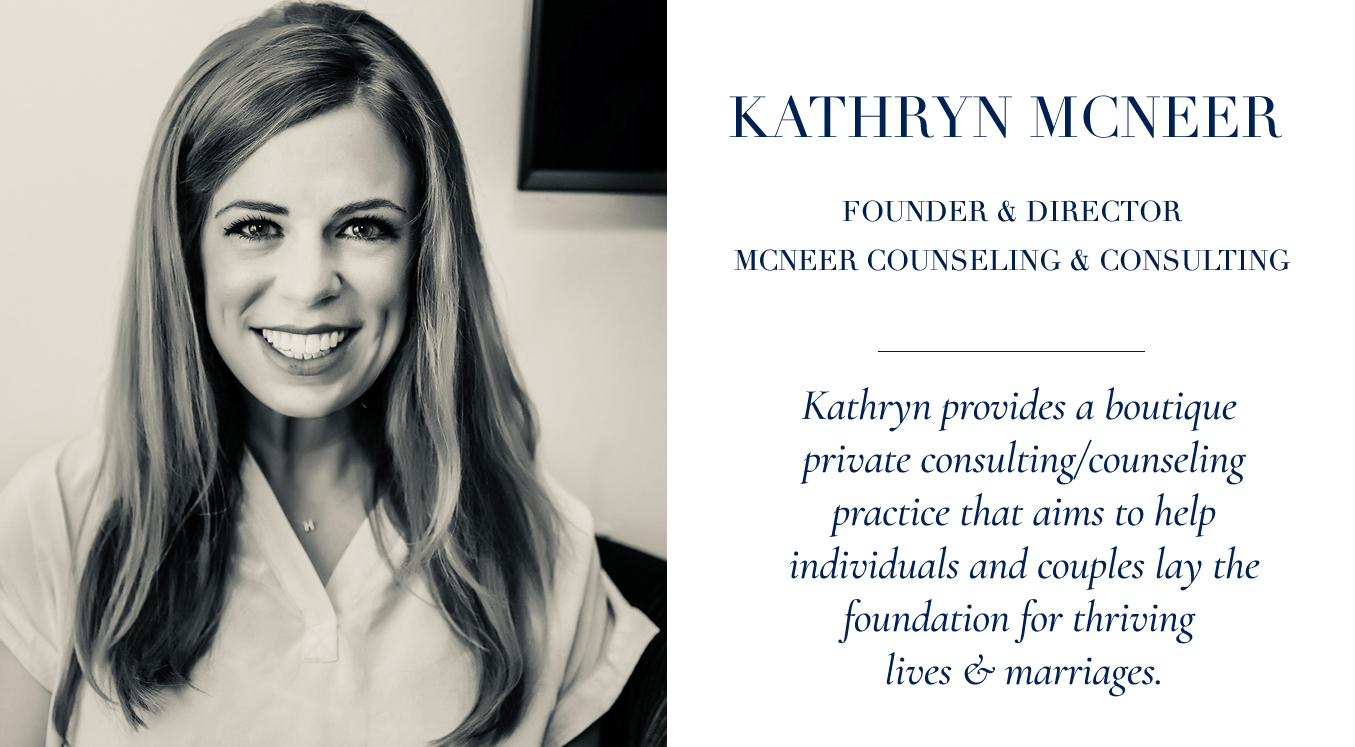
Kathryn is a seasoned counselor, relationship consultant and life coach. Kathryn started her career in counseling over 18 years ago and has a knack for helping individuals and couples amid life’s tough, tricky and complicated situations.
Kathryn uses research based, science backed interventions to help individuals connect to themselves and others. Kathryn sees clients with a variety of goals including but not limited to; couple’s work, decreased stress, increased communication skills, self -awareness and growth, she helps individuals and couples navigating transitions and has been known to help many a stressed -out mom and dad!
Kathryn’s extensive experience in marriage counseling lays the foundation for a healthy- direct, relationship consulting approach. Kathryn is no BS When it comes to couples. Kathryn looks at the patterns in the relationship that have developed over time and then works with the couple on which patterns are working for them, and which patterns may be working against them! Sometimes, it may be that the couple never really learned how to communicate, resulting in irritability and conflict. Kathryn helps the couple develop the tools to communicate effectively, ultimately leading to increased emotional connection and intimacy. Kathryn aims for the sessions to be full of intelligent, deep connecting conversations that ultimately produce life changing results.
Kathryn’s individual coaching and counseling experience runs the gamut from helping new mom’s transition to motherhood, individuals struggling with the “mid-life awakening,” and individuals adjusting to a new normal, with their children grown and gone. Kathryn provides useful feedback, resources and direction. Kathryn has been told her calming presence and use of humor in session is very cathartic for clients. Kathryn is available for virtual or in office sessions!
Credentials
LPC License # 67071
Licensed Professional Counselor
Master of Science, Counseling Psychology, University of Kansas
Bachelor of Science, Political Science, Texas Christian University
Austin Dupree, LPC-A

Austin specializes in counseling couples as well as individuals. She brings a direct yet caring approach to her solutions focused work with her clients.
When working with individuals or couples, Austin provides a nonjudgmental space for her clients to talk about their challenges and to support them in finding their own solutions. She works with individual adults dealing with anxiety, depression, stress, major life transitions, self- esteem, relationship issues, and grief. Austin helps her clients to identify patterns in their lives that are causing pain, frustration, and loss of identity and works to build authentic confidence. She enables her clients to create a new inner dialogue, set boundaries, and learn healthy emotional responses.
In her work with couples, Austin focuses on building communication and conflict resolution skills, increasing connection and well as regaining trust. She provides a non-judgmental space for her clients to have the conversations necessary for their relationships to flourish. In addition to couples counseling, Austin also offers premarital counseling for couples beginning their lives together.
Austin integrates different modalities in her work, including cognitive behavioral strategies, always focused on helping her clients find relief from what is distressing them. She believes that therapy is a collaborative effort in which she can help clients process difficult experiences and work to achieve their personal goals. She provides a safe and welcoming space to navigate client concerns and guide them through an individually tailored process of growth and healing.
Credentials
LPC-A License # 86933
Licensed Professional Counselor-Associate
Under the Supervision of Lora Peters License No. 65632
Master’s of Education, Counseling, Sul Ross State University
Bachelor’s of Arts, History, Women’s and Gender Studies, Furman University
Rates
Please click to see my rates.
Couples Therapy | Couples Counseling
Should You Try Couples Therapy?
Oftentimes people come to Marriage Counseling when they are deep in crisis. In fact, it may be a last-ditch effort to save the marriage even though you've been talking about divorce. Because of that, some people wonder whether it's worth the time, energy, and cost. If you're on your way to divorce court, is it better just to skip the counseling and head to a lawyer? Marriage Counseling may or may not save your marriage. But chances are that even if you end up getting a divorce, couples counseling can be an asset.
Couples Therapy Offer Crisis Management
If your relationship is in crisis, then couples counseling can help you deal with the immediate situation at hand. These appointments aren’t about deciding whether or not to get a divorce. Instead, they’re all about helping you each get back to a more balanced and centered place where it doesn’t feel like your world is falling apart.
It's easy to know if you're in a crisis if you're the kind of couple that argues loudly. You fight constantly, tell each other that you can't stand one another, and constantly threaten divorce. You can't seem to agree on anything, and every little thing becomes fodder for an argument. However, you can also be in quiet crisis. Some couples simply withdraw from one another, avoid each other, and don't talk at all. This, too, is a crisis. If you aren't healthily connected, then crisis counseling for couples can help.
You may also find yourself needing couples counseling during a crisis that isn’t just about your marriage. For example, if one of you has a substance misuse issue or a mental health crisis, then it can cause your marriage to feel like it’s disintegrating. When a child gets ill, it can cause a crisis in the family. After a death in the family, grief can become a crisis when it isn’t dealt with over time. If one of you in the marriage is in crisis, then the marriage might be in crisis, and couples counseling can help you get stable again.
Marriage Counseling to Decide About Divorce
Once you are each in a more stable place, you’ll be in a better position to make long-term decisions about your marriage. That’s when you can start getting honest about whether or not you want to consider a divorce. You may decide that you want to work through things. If you've gotten to the point where you were considering divorce, then chances are that you need to do some mending to the relationship as well as learn new communication skills in order to move forward in a healthy way.
Alternatively, you may decide not to stay married. If one or both of you becomes clear that divorce is what you want, then therapy can help you process that together. You may wonder why you’d want to be in therapy with someone that you’re planning to divorce. However, you’ve had a relationship with this person for a long time. They are a key part of your life. Working through the issues that brought you to this point together can help you both in the long-term, even if the relationship is coming to an end. Marriage Counseling can help you deal with individual and shared feelings of grief, loss, hopelessness, and fear about the future. It can also help you work through some of the practical aspects of divorce in a safe setting.
Couples Therapy for Rekindling Romance
Romance fades. However, that doesn’t mean that you’re doomed to a life of the doldrums after the honeymoon phase has worn off. Instead, it means that you need to reinvent your meaning of romance. More importantly, it means getting on the same page as your partner about what romance looks like as your marriage grows. Couples counseling can provide you with a terrific space for figuring that out.
From Romance to Roommates and Back Again
Most relationships follow a common arc in that they start hot and heavy and then fade into something less lusty but steadier. However, if you're not careful, the romance can slip so far away that it starts to feel like you're just roommates. When that happens, one or both of you are likely to become dissatisfied.
Unfortunately, you can’t go back to before when you barely knew each other. You can finish each other’s sentences. You know exactly how to push each other’s buttons. And you can’t stop engaging in the mundane details of everyday life. However, you can still get the romance back. It just looks a little different than when you first met. There’s nothing wrong with that. In fact, it gives you the opportunity to get creative, which can be wonderful.
Is There a Problem?
Sometimes romance fades just because of circumstance. You have a few children, you get busy with your careers, you deal with illness … and the romance just kind of slips away. However, sometimes a lack of romance is a sign of an underlying issue in the relationship. Couples counseling can help you come together to communicate about exactly what’s going on. You can figure out if there’s a bigger problem at play, and if so, how you want to address it.
For example, sometimes a lack of romance is due to a series of built-up resentments that you’ve failed to deal with over time. Couples therapy can help you air those resentments, communicate about them in a healthy way, and find methods of moving forward. Once you feel more connected again, the romance issue might resolve itself. If not, couples counseling can help with that too.
Rekindle the Spark in Your Relationship
Couples therapy can also simply serve as a catalyst to rekindle romance. Simply setting aside one hour per week to talk about your relationship is a strong show of commitment. While in therapy, you can communicate about ideas that you might have to rekindle romance. Sometimes you’re shy or afraid about doing that on your own but become empowered to do so in the therapy office.
Your therapist might also offer counseling exercises, therapeutic homework, or simply suggestions for how to find ways to rekindle romance at home. You might learn new techniques for practicing mindfulness in the relationship. You might set goals that help you get romance back on track. Alternatively, you might just find that you're more committed to date nights and weekend getaways since you feel a bit accountable for reporting back to your therapist.
Rekindling romance can be as simple as adding more handholding and deep kisses to your daily life. Or it can be much more in-depth and creative. The trick is to start somewhere. Couples therapy can help you both start on the same page.
Couples Therapy After Infidelity
Infidelity can often feel like the end of your relationship. However, it doesn't always have to mean that the relationship is over. Couples can and do work through infidelity. It's not an easy process. However, with the help of therapy, it can be done. In fact, you may discover that coming together after infidelity actually strengthens your marriage, despite the fact that at the moment it feels like things are all over.
Do You Want to Stay Together?
The biggest question many couples face after infidelity is whether or not they want to try to make the relationship work despite this huge breach of trust. The problem is that the answer is rarely immediate. There are a lot of emotions involved. There are a lot of concerns, doubts, and decisions to work through. One or both parties may be completely unsure of whether or not they want to stay together, which leaves the couple in limbo for some time. Often, people separate and get back together several times after infidelity as they try to figure out the answer to this question.
Therapy can help you make a solid decision about whether or not you want to stay together. Couples therapy will allow the two of you to discuss all of the challenging issues that have brought you to this point. As you communicate openly, you’ll be able to come to a decision about your relationship that’s rooted in the full reality of the relationship, not just as a reaction to infidelity. Whether or not you stay together, therapy can help you feel good about the final decision.
Dealing with Shame, Guilt, and Blame
Couples often get trapped in their feelings of shame, guilt, and blame after infidelity. The person who cheated might feel guilty about the affair. The person who was cheated on may blame the other for all of their pain. But sometimes the person who was cheated on feels ashamed or even guilty for reasons that they can’t explain. Sometimes the person who cheated blames the other for whatever led up to the affair in the first place.
Couples therapy helps you authentically work through these issues so that you can let go of shame, guilt, and blame. Something did lead up to this situation, and you do need to address it to move forward. However, the guilty feelings and overt blame aren't helping you to do that. Instead, therapy moves you through those feelings to the underlying core issues so that you can find real resolutions.
Changing Communication and Moving Forward
One of the key things that couples therapy offers after infidelity is a safe space to begin communicating in new ways. Whatever you were doing before wasn’t working. It’s time to start anew. If you decide that you want to stay together, then couples therapy can help you safely discuss all of the issues that brought you to this place. You can learn new communication tools that will allow you to deal with what has happened. Then you can find ways to move forward together as a stronger couple. Your therapist can guide you as you practice new ways of communicating.
Even if you ultimately decide to separate, communicating authentically in the therapy room can help you to find closure about the relationship. Both of you will be able to move forward with less animosity. This is what allows you to forge new relationships in the future without bringing in baggage from the past. Ultimately, whether you decide that you want to stay in the relationship after infidelity or not, therapy can help you both to put the situation behind you in a healthy way.
Money Disorders that Show Up in Couples Therapy
Money is one of the most common causes of conflict in a relationship. Therefore, it's one of the most common things that people deal with together in couples' therapy. Of course, oftentimes the issue turns out to be something other than money – such as issues related to trust, security, or even childhood trauma. But in some cases, there are money disorders going on that you need to address directly through therapy. Four common money disorders show up in couples counseling: financial infidelity, financial dependence, financial enabling, and financial manipulation.
What Is Financial Infidelity?
Put simply, financial infidelity is when you lie to your partner about money. Of course, each couple has their own boundaries when it comes to money. Some couples keep separate bank accounts and don’t pay attention as long as each pays their part of the bills. Others want to know how their partner spends every dime. How you handle your money is up to you, as long as both of you agree. However, once you’ve agreed, you have to stick to the rules and boundaries that you’ve established about money. If you don’t, then you may commit financial infidelity.
Examples of financial infidelity include:
- Hiding the credit card bills so your partner can’t see what you spent
- Opening up a secret bank account and/or credit card
- Running up gambling debts and not telling your partner you have a problem
- Quitting your job but pretending to still go to work every day
As you can see, the infractions run the gamut from small to major. Financial infidelity can lead to some serious money problems in a marriage. More importantly, though, it signifies a problem with trust and communication. You aren’t able to tell each other the truth about finances for one reason or another. Therefore, you have to get to the root of the problem. Couples therapy can help you figure that out. It can also help you established new, clear boundaries for discussing finances now and in the future.
What Is Financial Dependence?
Financial dependence means that you, as a capable adult, have given over some or all of your financial power to someone else. Certainly, some couples divvy up money in such a way that it can look like financial dependence when it's not. For example, one partner might handle all paying all of the bills. If the other partner has agreed to that, perhaps it's not a problem. However, in this day and age, it's generally advisable for both partners to have a solid working knowledge of what's happening with their finances.
While one of you may still opt to take on the bulk of accounting in the household, it shouldn’t be done in such a way that it creates a power imbalance. You should both be involved in making critical financial decisions in your home. At the very least, you should feel like you have the option to do so if you desire to. If that’s not the case, then one or both of you can end up resentful. For example, the partner who deals with the finances may feel like they have a huge burden while the other may feel like they’re being treated like a child.
Couples counseling can help you figure out how you got into a situation of financial dependence. Moreover, it can help you figure out new communication styles that will allow you to shift the power to a balance that feels more satisfying to both of you.
What Is Financial Enabling?
Financial enabling can go hand-in-hand with financial independence. The person who is controlling all of the money may be enabling the other person to avoid dealing with money. However, sometimes financial enabling causes problems in a marriage when one of the partners is enabling a third party.
Oftentimes, one of the partners might be financially enabling their adult child. The child never learned how to deal with their finances. The parent handles it all for them. In fact, they often financially bail out their adult child without a second thought. The other parent doesn’t agree with this and it causes problems.
Similarly, a partner might financially enable their own parent or sibling. Financial problems know no age limits. The strain this places on a marriage can be immense. Couples’ counseling can help you work through the friction it has caused over the years.
What Is Financial Manipulation?
Financial manipulation means that a parent has manipulated or forced their child to take on an inappropriate role with finances. In contrast to enabling the child to not deal with money, it requires the child to get overly involved with money. For example, if you have your child lie to debt collectors for you, then you’re committing financial manipulation.
One of the most common ways that this shows up in couples counseling is when one or both of the parents has put the child(ren) between them when it comes to money. They ask the child to lie to the other parent about finances. Or instead of discussing your money issues together, you fight about them through your child.
Some families will choose to deal with financial manipulation in family therapy. In some instances, that may be appropriate. However, couples counseling allows you to put an end to the financial manipulation and start learning how to deal with just each other in the marriage. Choosing couples therapy instead of asking your child to come to therapy to deal with the money issue makes a powerful statement that you’re truly ready to make a change.
Couples therapy can help couples who are dealing with all types of problems associated with money, whether they rise to the level of a money disorder or not.
Pre-Marital Counseling for Couples
Many people have mistaken ideas about what it means to get pre-marital counseling. They assume that you must be off to a bad start if you “need” therapy before you get married. Or they think that pre-marital counseling is only for religious couples who seek guidance through their church before marriage. While you can certainly seek that type of pre-marital counseling, it’s not the only reason to get therapy before getting married. In fact, many of the strongest marriages begin because they got off on the right foot thanks to therapy.
What is Pre-Marital Counseling?
Obviously, pre-marital counseling is couples’ therapy for people who are planning to get married. It’s provided by a licensed, trained therapist, just like any other type of couples’ counseling would be. It utilizes the same practices as other forms of couples’ therapy. The only difference is that the focus is on issues that concern you as you move forward together into marriage.
Addressing Issues in Pre-Marital Counseling
Sometimes getting married brings a very specific issue to the forefront. For example, as you plan the wedding, you begin to realize that you have extremely different philosophies about finances. Therefore, you might go to pre-marital couples’ counseling in order to deal with that very specific issue. Or perhaps one or both of you is feeling ambivalent about the marriage, and you need to address that in order to decide if you’re going to move forward with the wedding. Therapy can help you figure that out.
However, even if you don’t have a specific issue in mind, you can benefit from pre-marital counseling. Your therapist can help you identify what types of things currently concern you in the relationship or might be an issue in the future. They can point out some of the most common issues in a marriage that you might want to think about.
Some of the issues that you might address in pre-marital counseling include:
- Blended family issues including those related to exes and children from other partners
- Cultural and/or religious differences
- Desires about when and whether to have children, how many to have, how to handle potential fertility challenges, and what parenting together might look like
- Differences in communication styles and how to handle conflict
- Financial issues including beliefs about earning, saving, spending, and investing money
- Intimacy issues
- Problems associated with one or both sets of in-laws and/or friend circles
- Power imbalances and/or gender role beliefs
Planning for the Future in Pre-Marital Counseling
Pre-marital counseling isn’t just about “problems.” In fact, you might currently feel like there aren’t any big issues. That’s okay. Pre-marital counseling can also help you start setting goals for your shared future. By learning how to communicate about the future now, you start your relationship off with a strong foundation. Some of the things that you might discuss in therapy include:
- What do you want your family’s holiday traditions to be?
- How do you want to celebrate your relationship?
- What do you hope intimacy will look like in one year, five years, and ten years?
- How will you handle things if one of you gets very ill?
- What rituals would you like to create in your relationship?
- What expectations do you have about your separate roles in the marriage?
- How will you handle time apart from one another?
- What are your top values in the relationship?
You have the opportunity to create the relationship of your dreams. Premarital counseling can provide a starting place for beginning to draft that dream relationship together.




